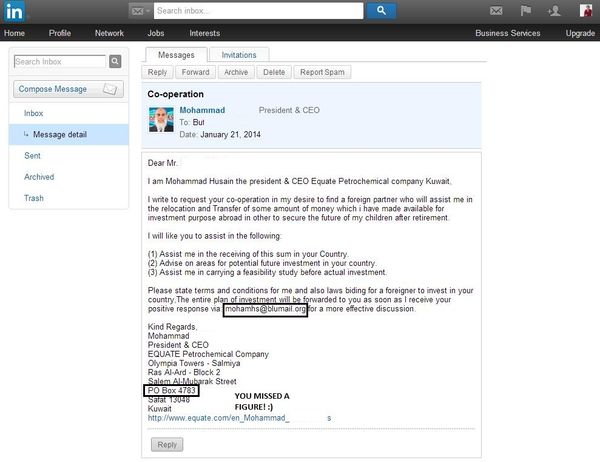New Nigerian Scams on LinkedIn Target Marketing, HR, Business Employees

A new series of Nigerian scams target corporate users on LinkedIn by sending them private messages, antivirus software provider Bitdefender has learned. This time, 419 scammers ask victims to cooperate in a money transfer that will “secure the future” of their children after retirement.
A fake profile created in the name of the CEO of a petrochemical company in Kuwait is inviting users to assist in receiving an investment in their country, give advice on potential opportunities and carry out a feasibility study before actual investment. Victims range from marketing, sales and HR employees to business consultancy managers.
To make the scam look like a legitimate business proposal, scammers give almost the exact Kuwait address of the company they impersonate. The only thing missed is a figure in the PO Box number. Of course, the “CEO” doesn`t have an e-mail address registered on the company`s domain, but on a private e-mail service, “for a more effective discussion.”
The petrochemical company is aware of scams that play with its reputation. “Recently, scam emails are being sent using Equate email IDs and name references,” a disclaimer on the company`s web site reads. “Equate does not send out emails soliciting business and assumes no responsibility/liability. Therefore, please ignore such emails and report to [email protected].”
The Kuwait-based petrochemical company is not the only one impersonated on LinkedIn lately. Scammers also pose as representatives of the Nat West Bank in the UK, while in 2013 they were sending business proposals on LinkedIn by impersonating the Standard Chartered Bank.
Nigerian or 419 scams are among the most common types of confidence tricks. Though they pre-date the Internet, they are still highly effective. A Microsoft study showed that cyber-crooks say they are Nigerian on purpose, as a gullibility filter, which allows them to only focus on the easiest of targets.
Researchers from Bitdefender have warned about Nigerian scams moving to social networks since 2008. You can learn more about these e-threats from the 10 things about Nigerian scams that you might not know.
Users are advised to only accept LinkedIn invitations from people they know and trust, and always be suspicious if someone offers them a piece of a multi-million dollar stash, no matter the medium.
tags
Author
Bianca Stanescu, the fiercest warrior princess in the Bitdefender news palace, is a down-to-earth journalist, who's always on to a cybertrendy story.
View all postsRight now Top posts
How to Protect Your WhatsApp from Hackers and Scammers – 8 Key Settings and Best Practices
April 03, 2025
Outpacing Cyberthreats: Bitdefender Together with Scuderia Ferrari HP in 2025
March 12, 2025
Streamjacking Scams On YouTube Leverage CS2 Pro Player Championships to Defraud Gamers
February 20, 2025
How to Identify and Protect Yourself from Gaming Laptop Scams
February 11, 2025
FOLLOW US ON SOCIAL MEDIA
You might also like
Bookmarks









